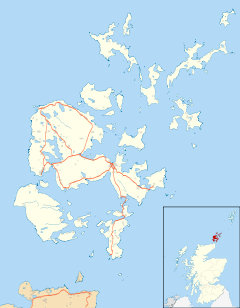The Bishop's Palace, Kirkwall is a 12th-century palace built at the same time as the adjacent St Magnus Cathedral in the centre of Kirkwall, Orkney, Scotland. It housed the cathedral's first bishop, William the Old of the Norwegian Catholic Church who took his authority from the Archbishop of Nidaros (Trondheim). The ruined structure now looks like a small castle.
| Bishop's Palace | |
|---|---|
 Bishop's Palace, seen from St Magnus Cathedral tower | |
| General information | |
| Status | in ruins |
| Type | palace |
| Architectural style | Romanesque, Gothic |
| Town or city | Kirkwall |
| Country | Scotland |
| Owner | Historic Environment Scotland |
History
editOriginally, it is thought to have been like a typical Royal Norwegian palace, with a large rectangular hall above store rooms and a tower house as the Bishop's private residence. King Haakon IV of Norway, overwintering after the Battle of Largs, died here in 1263, marking the end of Norse rule over the Outer Hebrides. The neglected palace had fallen into ruins by 1320.[1]
In 1468, Orkney and Shetland were pledged by Christian I of Denmark and Norway for the payment of the dowry of his daughter Margaret, betrothed to James III of Scotland, and as the money has never since been paid, their connection with the crown of Scotland has been perpetual. In 1526, the palace came briefly into the possession of William, Lord Sinclair, before he was ordered to return it to the Bishop of Orkney. When King James V of Scotland visited Kirkwall in 1540, he garrisoned his troops in the palace and in Kirkwall Castle. Soon afterwards, extensive restoration was begun by Bishop Robert Reid, the last of Orkney's medieval bishops, who also founded the University of Edinburgh. Reid added a round tower, the Moosie Toor.[2]
Mary I of England sent a fleet to Scotland in 1557, commanded by William Woodhouse and John Clere. Clere's troops attacked the cathedral on 12 August. The force was overpowered on the next day while attempting to capture the Bishop's Palace. Many of the retreating English, including Clere, drowned trying to reach their ships.[3]
Ownership passed to Robert Stewart, 1st Earl of Orkney, in 1568, then to his son Patrick Stewart, 2nd Earl of Orkney who planned to incorporate it into his Earl's Palace, Kirkwall, but debts forced him to return it to Bishop James Law. Earl Patrick's son Robert seized both palaces in 1614, and a siege followed, though it is not known if this caused damage to the structures, both of which are now ruins.[4]
Today
editThe palace is open to the public. It is administered by Historic Environment Scotland as a scheduled monument.[5]
The palace and the nearby Earl's Palace are closed to the public October 2023 - March 2024 during which time high level masonry inspections are being carried out as part of the building's conservation.[6]
References
edit- ^ "Castles and Buildings". Stewart Society. Retrieved 10 November 2020.
- ^ "Kirkwall, Palace Road, Bishop's Palace". Canmore. Retrieved 10 November 2020.
- ^ C. S. Knighton & David Loades, Navy of Edward VI and Mary I (Navy Records Society, 2011), pp. 342-5.
- ^ "Bishop's and Earl's Palace, Kirkwall". The Castles of Scotland. Retrieved 10 November 2020.
- ^ Historic Environment Scotland. "Bishop's Palace, Kirkwall (SM90193)". Retrieved 22 February 2019.
- ^ "Inspections begin at Bishop's and Earl's Palaces". Historic Environment Scotland. Retrieved 6 November 2023.
External links
edit- Historic Environment Scotland: Visitor guide
- Orkneyjar - The Bishop's Palace, Kirkwall
